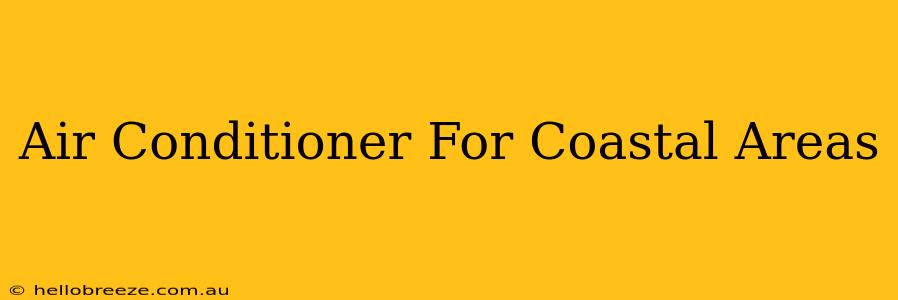Living in a coastal area offers breathtaking views and a refreshing sea breeze, but it also presents unique challenges, especially when it comes to choosing the right air conditioner. The salty air, humidity, and potential for strong winds can quickly damage standard AC units. This comprehensive guide will help you select the best air conditioner for coastal areas, ensuring years of cool comfort without the constant worry of corrosion and breakdowns.
Understanding the Coastal Climate's Impact on Air Conditioners
Coastal areas are notorious for their harsh environmental conditions. These factors significantly impact the lifespan and efficiency of your air conditioner:
Salt Corrosion: The Biggest Threat
Salt spray is the primary enemy of air conditioners near the coast. The salt in the air accelerates corrosion, damaging the unit's exterior and internal components, including the coils, fins, and wiring. This leads to reduced efficiency, frequent repairs, and a shorter lifespan.
High Humidity: A Breeding Ground for Problems
High humidity levels are another significant challenge. Excess moisture encourages the growth of mold and mildew, potentially clogging air filters and impacting the efficiency of the cooling system. It also contributes to corrosion and can lead to electrical problems.
Strong Winds and Storms: Potential for Physical Damage
Coastal areas frequently experience strong winds and occasional storms. These can cause physical damage to outdoor AC units, dislodging components or even blowing the entire unit over.
Choosing the Right Air Conditioner for Your Coastal Home
Selecting an air conditioner designed to withstand coastal conditions is crucial. Here's what to look for:
Durable Construction Materials: Resisting the Elements
Look for units constructed from corrosion-resistant materials. Aluminum is commonly used, but stainless steel or galvanized steel offers superior protection against salt corrosion. Check the manufacturer's specifications to ensure the unit is specifically designed for harsh environments.
Protective Coatings: An Added Layer of Defense
Many manufacturers offer air conditioners with special protective coatings to further enhance corrosion resistance. These coatings create a barrier between the metal and the salty air, extending the unit's lifespan significantly.
Powerful Fans and Efficient Coils: Overcoming Humidity
High humidity requires a powerful fan to circulate air effectively and prevent condensation buildup. Efficient coils, often made of corrosion-resistant materials, are also crucial for maintaining cooling capacity in humid conditions.
Sturdy Construction and Secure Mounting: Weathering the Storms
Choose an air conditioner with a robust design and ensure it is securely mounted to withstand strong winds and potential storms. Consult with an HVAC professional for proper installation to minimize the risk of damage.
Regular Maintenance: Essential for Longevity
Even the most durable air conditioner requires regular maintenance in a coastal environment. Schedule annual inspections and cleaning to remove salt buildup, debris, and mold, ensuring optimal performance and extending its lifespan. This includes cleaning the coils, checking for corrosion, and lubricating moving parts.
Types of Air Conditioners Suitable for Coastal Areas
While any type of air conditioner can be used, some are inherently better suited to coastal environments:
-
Central Air Conditioning Systems: While requiring more initial investment, central AC offers superior climate control and is often built with more robust components compared to window or portable units. Look for systems with corrosion-resistant materials.
-
Ductless Mini-Split Systems: These systems offer excellent efficiency and can be individually controlled in different rooms. Their compact outdoor units can be positioned strategically to minimize exposure to salt spray and wind.
-
High-Efficiency Air Conditioners (SEER rating): Investing in high-efficiency models can offset higher initial costs with reduced energy consumption and lower operational expenses over time. A higher SEER rating indicates better energy efficiency.
Conclusion: Protecting Your Investment in Coastal Living
Choosing the right air conditioner is a crucial investment for homeowners in coastal regions. By selecting a unit constructed from durable materials, employing protective coatings, and implementing a robust maintenance schedule, you can ensure years of reliable cooling comfort, while protecting your investment from the damaging effects of the coastal environment. Remember to consult with an HVAC professional for advice tailored to your specific location and needs. They can guide you towards the best solution for your home and budget.

